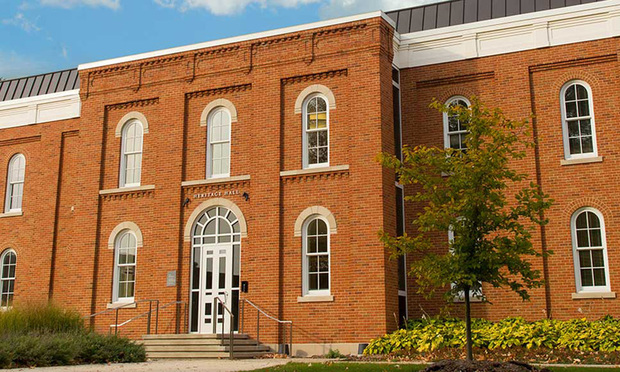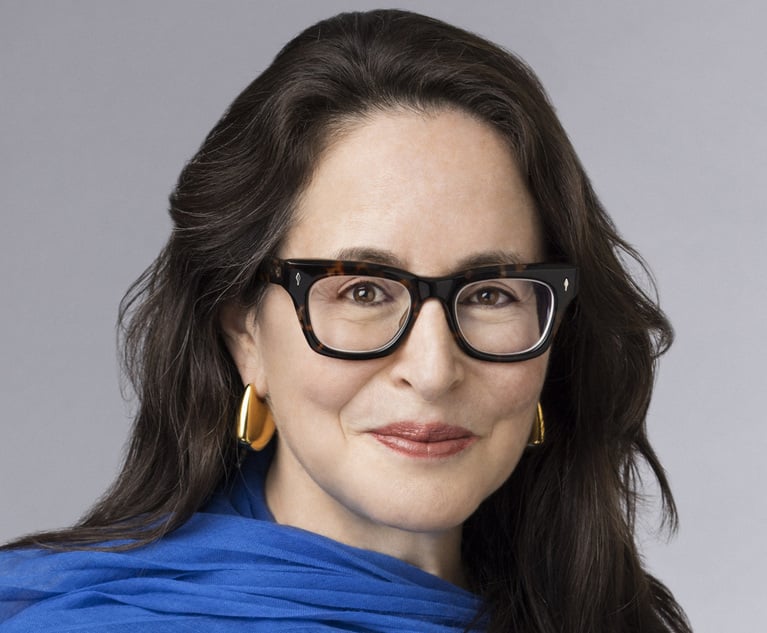Valparaiso Is Latest to Join the Crowd of Defunct Law Schools
Officials announced this week that the law school will shut down no later than May 2020. Enrollment has dwindled and a proposal to move the school to Middle Tennessee State University was rejected by state regulators.
October 31, 2018 at 01:21 PM
6 minute read
 Valparaiso University Law School.
Valparaiso University Law School.
After 139 years in operation, Valparaiso University School of Law is calling it quits.
Officials announced Tuesday that the Indiana law school will close once its remaining 100 second- and third-year students graduate. The move was not unexpected, as the campus struggled with accreditation problems and dwindling enrollment in recent years. Administrators said they saw no way forward once state regulators in Tennessee nixed a planned relocation of the law school to a public university there.
“This has been an extremely difficult decision and is the result of several years of careful discernment,” said Frederick Kraegel, chairman of the board of directors of Valparaiso University, in an announcement of the closure plan. “We have explored a number of strategic alternatives. Despite these efforts, we have not been able to achieve a more positive outcome.”
It marks the second time in as many weeks that an American Bar Association-accredited law school has said it will shut down. Last week, Arizona Summit Law School president Peter Goplerud told the Arizona State Board for Private Postsecondary Education that the Phoenix school is ending its fight to hang on to its ABA accreditation and will officially close once its remaining students complete their law degrees at other schools. (The ABA revoked Arizona Summit's accreditation in June and the school canceled all classes this semester.)
➤➤ Stay on top of developments and trends in legal education with Ahead of the Curve by Karen Sloan, a new weekly briefing from Law.com. Sign up here and get next week's email update straight to your inbox.
It appears that legal education's long-discussed reckoning is underway. Eight ABA-accredited schools or branch campuses have closed or announced plans to close since 2014, amid the national downturn in law school enrollment. There was just one closure per year from 2014 to 2016, but the pace accelerated in 2017 when the Charlotte School of Law closed and Whittier Law School announced plans to wind down.
The latest closures have been prompted both by the ABA's crackdown on underperforming campuses and the culmination of seven years of a shrinking national applicant pool. (Applications were up substantially this year for the first time since 2010.)
In addition to Arizona Summit and Valparaiso, 2018 saw the closure of Savannah Law School, the 6-year-old branch campus of Atlanta's John Marshall Law School. Each of the schools or campuses that have closed are unranked by U.S. News & World Report, with the exception of William Mitchell College of Law, which was ranked No. 135 when it merged with the No. 121-ranked Hamline University School of Law in 2015 to become the Mitchell Hamline School of Law. The combined school is currently unranked.
“We still have a number of closures to go before everything is back in balance,” said Bernie Burk, a former professor at the University of North Carolina School of Law who studies the economics of legal education. “It's very hard to predict when they're going to occur. Quite a few of those schools have been losing a lot of money for multiple years now. But every school has a different financial situation, in terms of whether they have an endowment, or what kinds of support the university they are affiliated with is willing to provide them and for how long.”
Valparaiso is Indiana's second law school to close in recent years. Indiana Tech Law School shuttered in 2016 after just four years in operation, after failing to attract enough students to be viable.
But Valparaiso is very different from the upstart Indiana Tech. It was established in 1879 and enjoyed a solid reputation until recently, when it struggled to bring in quality students and help them secure legal employment.
Valparaiso enrolled just 29 new students in the fall of 2017, compared with 208 new students in the fall of 2013. The ABA publicly censured the law school in 2016 for failing to comply with admissions standards. (The sanction was lifted in 2017.) The median Law School Admission Test score of new students fell from 149 in 2011 to 144 in 2013. The school raised the Median LSAT score in subsequent years but took in far fewer students in the process. The school's bar pass rate also fell during that time. Valparaiso reported a 47 percent bar pass rate in 2017.
University officials did not respond to requests for comment Wednesday, but President Mark Heckler told Inside Higher Education that the law school will submit a teach-out plan to the ABA, the details of which have yet to be established. In any case, the school will close no later than May 2020, he said. Valparaiso might retain a pared-down faculty to teach the remaining third-year students next year, or students may end up finishing their studies at other law schools. Valparaiso is about 50 miles outside of Chicago, which has six law schools.
The university had hoped to gift the law school to Middle Tennessee State University. Officials at the Murfreesboro public university agreed to the plan, but the Tennessee Higher Education Commission rejected the proposal earlier this month after a consultant concluded that the transfer would cost more than anticipated and that Tennessee did not need a seventh law school. The state's existing law schools also opposed the move.
“There's debate among academy watchers as to how many closures we're going to see by, say, 2030,” Burk said. “I wouldn't be surprised to see 20 [in addition to the already-closed campuses], but I think it will take a while. I wouldn't be surprised to see 30 and I wouldn't be surprised to see 10. There are a lot of schools that are operating in a financially unsustainable way, with no apparent path to reaching sustainability.”
Read more:
This content has been archived. It is available through our partners, LexisNexis® and Bloomberg Law.
To view this content, please continue to their sites.
Not a Lexis Subscriber?
Subscribe Now
Not a Bloomberg Law Subscriber?
Subscribe Now
NOT FOR REPRINT
© 2025 ALM Global, LLC, All Rights Reserved. Request academic re-use from www.copyright.com. All other uses, submit a request to [email protected]. For more information visit Asset & Logo Licensing.
You Might Like
View All
Morgan Lewis Shutters Shenzhen Office Less Than Two Years After Launch


University of Chicago Accused of Evicting Student for Attending Gaza-Israel Protest
3 minute read
State Appellate Court Rejects Reasoning for Attorney's Removal From Conservatorship
5 minute readTrending Stories
- 1Invoking Trump, AG Bonta Reminds Lawyers of Duties to Noncitizens in Plea Dealing
- 222-Count Indictment Is Just the Start of SCOTUSBlog Atty's Legal Problems, Experts Say
- 3Judge Rejects Walgreens' Contractual Dispute Against Founder's Family Member
- 4FTC Sues PepsiCo for Alleged Price Break to Big-Box Retailer, Incurs Holyoak's Wrath
- 5Greenberg Traurig Litigation Co-Chair Returning After Three Years as US Attorney
Who Got The Work
J. Brugh Lower of Gibbons has entered an appearance for industrial equipment supplier Devco Corporation in a pending trademark infringement lawsuit. The suit, accusing the defendant of selling knock-off Graco products, was filed Dec. 18 in New Jersey District Court by Rivkin Radler on behalf of Graco Inc. and Graco Minnesota. The case, assigned to U.S. District Judge Zahid N. Quraishi, is 3:24-cv-11294, Graco Inc. et al v. Devco Corporation.
Who Got The Work
Rebecca Maller-Stein and Kent A. Yalowitz of Arnold & Porter Kaye Scholer have entered their appearances for Hanaco Venture Capital and its executives, Lior Prosor and David Frankel, in a pending securities lawsuit. The action, filed on Dec. 24 in New York Southern District Court by Zell, Aron & Co. on behalf of Goldeneye Advisors, accuses the defendants of negligently and fraudulently managing the plaintiff's $1 million investment. The case, assigned to U.S. District Judge Vernon S. Broderick, is 1:24-cv-09918, Goldeneye Advisors, LLC v. Hanaco Venture Capital, Ltd. et al.
Who Got The Work
Attorneys from A&O Shearman has stepped in as defense counsel for Toronto-Dominion Bank and other defendants in a pending securities class action. The suit, filed Dec. 11 in New York Southern District Court by Bleichmar Fonti & Auld, accuses the defendants of concealing the bank's 'pervasive' deficiencies in regards to its compliance with the Bank Secrecy Act and the quality of its anti-money laundering controls. The case, assigned to U.S. District Judge Arun Subramanian, is 1:24-cv-09445, Gonzalez v. The Toronto-Dominion Bank et al.
Who Got The Work
Crown Castle International, a Pennsylvania company providing shared communications infrastructure, has turned to Luke D. Wolf of Gordon Rees Scully Mansukhani to fend off a pending breach-of-contract lawsuit. The court action, filed Nov. 25 in Michigan Eastern District Court by Hooper Hathaway PC on behalf of The Town Residences LLC, accuses Crown Castle of failing to transfer approximately $30,000 in utility payments from T-Mobile in breach of a roof-top lease and assignment agreement. The case, assigned to U.S. District Judge Susan K. Declercq, is 2:24-cv-13131, The Town Residences LLC v. T-Mobile US, Inc. et al.
Who Got The Work
Wilfred P. Coronato and Daniel M. Schwartz of McCarter & English have stepped in as defense counsel to Electrolux Home Products Inc. in a pending product liability lawsuit. The court action, filed Nov. 26 in New York Eastern District Court by Poulos Lopiccolo PC and Nagel Rice LLP on behalf of David Stern, alleges that the defendant's refrigerators’ drawers and shelving repeatedly break and fall apart within months after purchase. The case, assigned to U.S. District Judge Joan M. Azrack, is 2:24-cv-08204, Stern v. Electrolux Home Products, Inc.
Featured Firms
Law Offices of Gary Martin Hays & Associates, P.C.
(470) 294-1674
Law Offices of Mark E. Salomone
(857) 444-6468
Smith & Hassler
(713) 739-1250








